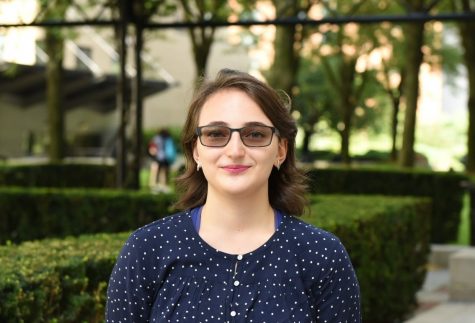Fordham Angel Fund Paves Way for Student Entrepreneurs
COURTESY OF TEYMUR GULIYEV
Now checking in via Zoom, the FAF fellows meet once a week to discuss applications for the possibility of a $25,000 investment.
October 18, 2020
“As a student at Fordham, I was so passionate about startups, and venture capital innovation, but I had no idea what to do about that. I was always thinking about business plans and new ideas; however, I had zero idea how to fundraise,” said Vipin Chamakkala, Gabelli School of Business at Rose Hill ’10, director at Sequoia Capital and member of the investment committee (IC) at the Fordham Angel Fund (FAF).
At Fordham University’s Foundry, the FAF is responding to the needs of students like Chamakkala through their recently founded program. The FAF has created a new opportunity for student entrepreneurs to apply for $25,000 through the investment process of a venture capital fund.
The FAF was founded in 2019, and according to Bronson Lingamfelter, co-founder and managing partner at Whitelabel Venture Capital, and a member of the IC. He explained, “Fordham is pioneering a unique model to offer (experiential) learning for students who are learning entrepreneurship, and those who want to learn what it is like to be an investor.”
Venture capital can be described as “funding in the form of an equity investment to entrepreneurs for early stage companies,” explained Jerome Wong, program director of the masters of science in global finance at the Gabelli School of Business, co-founder of Angelus Funding and a member of the IC at the FAF.
Different groups of people all work together to promote successful entrepreneurship at the FAF. The FAF founders are students who are applying for funding. The FAF fellows are a team of undergraduate and graduate Fordham students who review applications and work with the founders to address any risks their businesses may have.
However, the FAF does not view businesses having risks as an issue. Instead, the FAF “believes that being aware of problems is one of the keys to the success of any business. Not facing these risks creates a larger issue than confronting them early on in the life of the business.”
Finally, the fellows present the founder’s ideas to the IC, a group of venture capital professionals who advise the fellows throughout the reviewing process and recommend whether a business should receive funding or not.
We want to create an entrepreneurial eco-system at Fordham where students have the support and resources to bring their startup ideas to fruition … this is the best way we can pay it forward, by training the next generation of investors. Jerome Wong, investment committee member at the Fordham Angel Fund
Teymur Guliyev, Fordham College at Lincoln Center ’21 and business editor emeritus for The Observer, is a fellow at the FAF and the director of business development. In his role, he manages the six Lincoln Center fellows and makes sure that the student body is aware of the opportunity the FAF offers so that the fellows have a sufficient amount of applications to go through.
The FAF has a detailed five-step investment process that they go through in order to determine if a business is developed enough.
The first step begins when the fellows receive an application through a Google Form.
The FAF fellows meet every week via Zoom to discuss applications. Then, a fellow, such as Akshath Umesh, Gabelli School of Business at Lincoln Center ’22, will be assigned to work with the applicant. Umesh, like every fellow, is responsible for “working with the founding team and doing due diligence for the companies I am assigned,” according to Umesh. Due diligence is defined as a series of questions that determine whether the business has potential in terms of scalability and survival. The fellow then pitches anew to fellow FAF team members.
The fellow will then schedule a follow-up meeting with the founder and relay any questions the team members had during the pitch. At this point, the fellow can decide whether the business has the potential to continue to step three, which is the request for a minimum viable product (MVP). An MVP is a demo of the main product or service the business is offering.
According to Guliyev, the company will then create an account on the investment logging platform Gust, which creates a profile with information such as “business description, financial information, market data, and more.”
If the FAF fellow team is comfortable with the information they have received, they will prepare to pitch the business to the IC in step four. The fellows present to the IC once a month via Zoom.
For the applications that are not developed enough to be invested in, the FAF keeps the founders within its consulting network. The FAF can provide legal services and mentorship through the experienced IC members even if the founders do not receive an investment.
Chamakkala recalls his favorite memory from working with the FAF that occurred during this step. “I could tell pitching to the IC was definitely a new muscle that this student was exercising so afterwards I got on a call with him, and I just let him know that the criticism we brought in as an IC is completely normal. I know that it was an uncomfortable experience, but it’s an amazing learning experience to be in the hot seat,” he said.
Wong said he works with the FAF fellows because “We want to create an entrepreneurial eco-system at Fordham where students have the support and resources to bring their startup ideas to fruition … this is the best way we can pay it forward, by training the next generation of investors.”
The IC will then return with one of three possible decisions: No interest in pursuing this investment; the company is not ready for an investment, but please follow up with them to assess progress against the following; or please schedule the company to meet with the IC next month.
The fifth and final step is where the founders themselves prepare a presentation and present to the IC — a decision on funding is finally made here.
Umesh revealed that so far, no businesses have been adequate enough to reach step five. However, he notes, “Don’t let this discourage you. Who knows? Your company might be the first to get funding.”
“In venture capital, it is known that you have to go through hundreds of applications before you find a venture that is fundable,” Guliyev said.
For the applications that are not developed enough to be invested in, the FAF keeps the founders within its consulting network. The FAF can provide legal services and mentorship through the experienced IC members even if the founders do not receive an investment.
According to Lingamfelter, working with the FAF is a great way to start out and gain first-hand experience as to what it’s like in the entrepreneurial world. “There is no substitute for doing. If you think you want to be an entrepreneur at any point in your life, take advantage of the opportunity to try it now while you have the support of the university and your fellow students.”
The FAF is currently accepting applications on a rolling basis and is open to all students who “are ready and willing to expand their business and hope to see it reach the next level,” Guliyev said.
Even though the process may appear daunting to some, it could be the first step in establishing a dream business. Guliyev feels that “For entrepreneurs, sacrificing, working long days, taking risks, and putting your entire heart into something you believe in, is a normal practice.”















